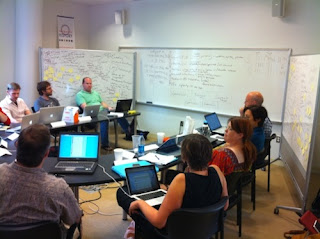One of the things I realized towards to end of my experience at "One Week | One Tool" was how very Quakerly it was. This might have been why I felt so comfortable with the process. Some of the main points of comparison:
- The group came together on even footing, with no assertion of personal or institutional authority. In that same vein, everyone was given the opportunity to give input on our process. Ironically, it was some of the youngest of us who held the 'lead' positions. And, each of the three sub-teams had female leaders (a rarity in the IT and DH world).
- Though we had a defined goal (to create a tool), there was little sense of how exactly we would arrive at that goal. Much of it was left to personal and group inspiration.
- We worked together by seeing the best in each other--through identifying each others' strengths and leveraging them.
- When we sat in meetings, it was often in a circle of chairs, facing each other.
- People dressed comfortably (not to impress each other). We ate simply (though well). We were more focused on the task at hand than on our personal needs (including our needs for sleep). We lived mostly communally--sharing each others' space and company for the whole week (with the exception of those few hours we retreated to our individual hotel rooms).
- Both documentation and code-writing were done collectively.
In general I find that the web-based world is a good space for challenging traditional notions of authority--especially when no one knows who really is behind that string of text that appears on a computer screen. For this middle-aged, one-legged female, it's an asset that my online presence often precedes peoples' acquaintance with my 'real' self, because my ideas/writings/skills become more important than my non-normative body. I've heard it suggested that the internet is a 'democratizing' force that has the potential to disrupt many of the structures of contemporary society. I don't know if I wholly agree that that's the case (especially with the problems of the digital divide) but it's satisfying to know that there's now a solid workable model for decentralizing the work done by tech-minded humanists, and that the tool we created, Anthologize, will also create possibilities for those of us who do primarily online writing--to have an open-source method for refining and packaging our ideas.

No comments:
Post a Comment